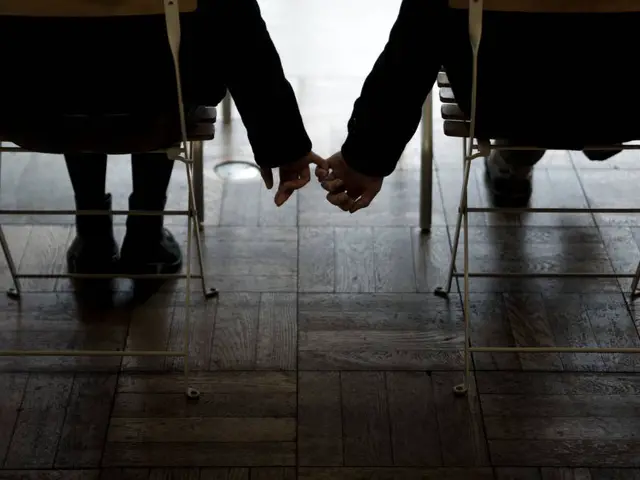At 13 years old I received my first ラブレター (rabu retā, love letter) stashed in my personal 下駄箱 (getabako, shoe box) at my 中学校 (chūgakkō, junior high school).
In case you didn’t know, thegetabakohas been the classic hiding place of love letters for generations of Japanese teenagers, and it remains so to this day. What’s Japanese puberty without the glorious sight of an envelope resting atop one’s battered 上履き (uwabaki, indoor shoes)?
I held onto the letter throughout the day but somehow mislaid it when I got home. Unfortunately my father spotted it later that night and called me to the 食卓 (shokutaku, kitchen table) — since our cramped 社宅 (shataku, company apartment) did not allow a study. I was told to cease such nonsense immediately and guard against all males — or otherwise risk ending up pregnant, causing my parents great stress and hassle.
I tell this little story because I feel it’s emblematic of how the Japanese tend to view the issue of love. Of course, times have changed and Japanese society seems more open than it has ever been, でもはっきり言うと (demo hakkiri iu to, but the fact of the matter is), deep in the core of this stubborn 父権社会 (fukenshakai, partriarchal society) is the belief that love and all its trimmings will lead to great stress and hassle, and thus we should cease such nonsense immediately.
And now, a ton of years after that incident, I regret to have to report that 日本の男と女は相変わらずわかりあえない (Nihon no otoko to onna wa aikawarazu wakariaenai, “Japanese men and women are just as bad at understanding each other as ever”). You have only to step into the nearest 居酒屋 (izakaya, Japanese pub) to see the segregation between genders — the salarymen airing their complaints about their 会社 (kaisha, company) in one corner and the 女子会 (joshikai, girls’ night out) ladies airing their complaints about the lack of いい男 (ii otoko, hot guys) in another corner.
You’d think these two groups would be bound to start mingling at some point in the evening, but that rarely happens. For casual encounters not involving elaborate 合コン (gōkon, matchmaking parties) arrangements, people make tracks to the trendy 相席酒場 (aisekisakaba, sharing-the-same-table pubs) and restaurants. In such establishments, groups of women — provided they’re under 30 — can sit down at the same table with eligible bachelors for a bit of spontaneous 婚活 (konkatsu, marriage-seeking activities).
Typically, women are asked to state their ages at the 受付 (uketsuke, reception desk), and the younger they are, the better their chances of having dinner with genuinely single (because not everyone is honest) under-40 men with steady incomes. Since the male groups are expected to pick up the bulk of the check, some young women go to theaisekiplaces solely for a free dinner, according to my 24-year old niece: お給料日前は誰かにおごってもらわないと餓死しちゃう (O-kyūryōbi mae wa, dareka ni ogotte morawanai to gashi-shichau, “When it gets near pay day, I’d starve to death if someone didn’t treat me to a meal”).
Cadging for meals and “age harassment.” Is this what the Japanese talk about when we speak of love? Sadly, the bottom line in Japanese relationships is often just that: the bottom line. Too often, love is defined by personal finances and the state of the economy. The very first item on akonkatsuagency’s questionnaire pertains to a person’s 年収 (nenshū, yearly income) and if the woman happens to be 無職 (mushoku, unemployed), there’s a question about her parents’ financial status.
The price tag on love and marriage seems to go up by the year. My friend Kumi, who is 38, says: この年で贅沢は言わないよ、年収700万あって禿げていなければ (Kono toshi de zeitaku wa iwanai yo, nenshū nanahyaku-man atte hageteinakereba, “At this age, I’m not going to be extravagant about it — I just want someone with a yearly income of over ¥7 million who’s not bald”). As for the man’s personality, political views, whether or not he’s racist, misogynist or that hated of all things, a 亭主関白 (teishukanpaku, domineering husband)? そんなのは後で話し合えばいい (Sonna no wa ato de hanashiaeba ii, “We could sort all that out later”), says Kumi. For her, the ¥7 million bar is the only point where she’s not willing to compromise. お金持ってない男は信用できない (O-kane-mottenai otoko wa shinyō dekinai, “I can’t trust a man with no money”), she says.
It’s likely that Japanese women don’t trust men, period. For centuries, women have lived in the shadow of men. They were banned from working, having independent means, opinions or preferences. Very few women entered into 恋愛結婚 (ren’ai kekkon, love marriages) until after World War II, and even then, 愛 (ai, love) largely meant toiling endlessly in the house to ensure that the husband and children were comfortable.
The Japanese suck at this thing called love, and no amount of Valentine’s Day 義理チョコ (girichoko, obligatory chocolates) is going to fix that.
(Japan Times)
 简体中文
简体中文

